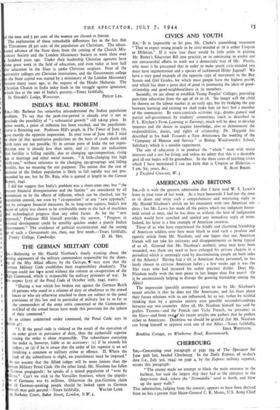" That to expect young people to be civic-minded at
t8 is either Utopian or Hitlerian." If it were true there would be little point in putting Mr. Butler's Education Bill into practice, or in continuing to evolve our not unsuccessful efforts to work out a democratic way of life. Firstly, why must it be presumed that in order to make youth civic-minded you must have regimentation and a species of jackbooted Hitler Jugend? We have a very good example of the opposite type of movement in the Boy Scouts and Girl Guides, for which most people have the highest praise', and which has done a great deal of good in promoting the ideas of good- citizenship and good-neighbourliness in its members.
Secondly, we are about to establish Young Peoples' Colleges, providing part-time education from the age of 16 to 18. No longer will the child be thrown on the labour market at an early age, but by bridging the gap between learning and earning we shall make him (or her) feel a member of the community. By extra-curricula activities (e.g., drama, games) and partial self-government by students' committees (such as described in P. L. Kitchen's From Learning to Earning), much will be done to develop interests and the desire to acquire knowledge, also to demonstrate the responsibilities, duties, and rights of citizenship. Dr. Happold has described in his book Towards a New Aristocracy the working of the " Company of Honour and Service " at Bishop Wordsworth's School, Salisbury, which is a notable experiment.
The aim of education is to produce the " whole " man with many interests and a zest for living, and unless we admit that this is a desirable goal all our hopes will be groundless. In the three cases of teaching civics which I have mentioned I can see little that is Utopian or Hitlerian.—


























 Previous page
Previous page